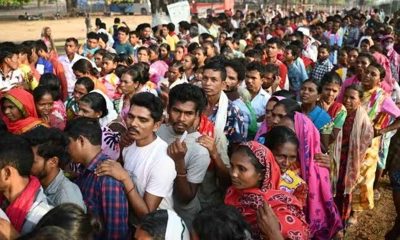Blogs
List of the most common reasons for taking personal loan in the Philippines
Taking personal loans is so frequent in the Philippines that it has become ingrained in the culture. When you have a financial goal to achieve, you should first seek a loan or call a friend for help. As a result, “Kumusta ka na?” has in a way become a regular preface to “Pautang naman,” with the people when they receive your message that you want to take a loan and they become confused on whether to lend you the money or ignore your message.

Taking personal loans is so frequent in the Philippines that it has become ingrained in the culture. When you have a financial goal to achieve, you should first seek a loan or call a friend for help. As a result, “Kumusta ka na?” has in a way become a regular preface to “Pautang naman,” with the people when they receive your message that you want to take a loan and they become confused on whether to lend you the money or ignore your message.
Borrowing money has degraded the reputation of many Filipinos that it is generally the final resort for those in desperate need of funds. The absence of suitable loan motives, which brings about bad utang behaviors, has not helped either.
Money, on the other hand, is extremely important in our lives. Unforeseen circumstances, like hospital bills, can make you pay the money you don’t plan to spend. To avoid getting into bad debts, make sure your reasons for getting a loan are rational, realistic, important, and pressing before applying for a loan.
Some of the most compelling reasons to take out a personal loan that will benefit you and the overall well-being of your family include:
What do you need a loan for?
You must be clear on what you need a loan on before applying for a loan. The major reason for getting a loan is important regarding how you will manage the loan and make sure that the loan is used for what you planned to use it for. This is because holding cash at hand is highly tempting, and you may be tempted to spend it on things that are not important to you.
If you’re applying for a loan to spend on home reconstruction, you should have already calculated the whole expenditures, including hidden fees. Consider your ability to pay for daily vehicle maintenance in addition to your monthly loan repayments if you’re seeking a personal loan for a new vehicle. By doing this, you won’t have to apply for another loan if you discover that your current loan isn’t adequate to meet all of your operating costs.
3 Great Reasons to Apply for a Loan
1. Educate yourself
Whether you’re pursuing higher education for a job promotion or paying your children’s college education to guarantee their future, education is a wise investment. Even though education is a fundamental right in the Philippines, many families cannot pay for it. Prepare to invest more than a hundred thousand pesos yearly if you want your child to receive a top-notch education at a prestigious university. Prepare up to PHP 300,000 per semester if you intend to send your child to medical school.
You can start saving for your child’s college fund many years in advance. If you’re short on cash this year and need to pay for tuition, consider taking out a personal loan for educational purposes with a minimal interest rate and a fixed repayment condition.
2. Hospital Emergencies
Unexpected medical expenses, such as hospital bills, should be covered by your emergency fund, health insurance, and Phil Health membership. However, when you are sick, there are other costs to consider, such as drugs and post-surgery therapies. Maternity care costs can also deplete your finances if you’re expecting a child.
These unavoidable costs cannot be postponed. A personal loan can help you pay for unforeseen and crucial expenses if you find yourself in a financial bind during or after an illness.
3. Electronic Gadgets
Getting a personal loan to buy the latest iPhone model when your current phone is still functional isn’t one of the finest reasons. Rather, equipment and gadgets that will help you generate more money (such as durable and quality washing machines for your laundry business or a new personal computer for your freelance gig) are items that make a personal loan an excellent option.
Iren Reyes, content marketing specialist for AllTheBestLoans, do not recommends buying a gadget on credit for which you will pay more than 20% of your monthly income each month.
Last Thoughts
Personal loans can help you achieve your financial objectives and keep you on top of your finances if you use them wisely. Choosing the right personal loan in the Philippines and efficiently planning your repayments can also be aided by having the right loan purposes. You’ll obtain a fixed payback term and interest rate with a personal loan from a reputed lender in the Philippines, making monthly budgeting straightforward and seamless.
It is simple to apply for a personal loan. You’re eligible if you’ve been employed or self-employed for at least two years and have a minimum required income. Make sure you compare the best personal loans available in the country before submitting an application.
Blogs
Fueling Rural Entrepreneurship: Small Business Loans Revolutionizing Rural India

New Delhi (India), July 15: Rural areas form the backbone of India’s economy, with a vast population engaged in agriculture and small-scale enterprises. However, accessing financial resources to fuel rural entrepreneurship has traditionally been challenging. Small business loans have emerged as a powerful tool in revolutionizing rural India, providing much-needed capital to aspiring entrepreneurs and driving economic growth. In this blog, we will explore how small business loans are transforming the rural entrepreneurial landscape, fostering innovation, creating employment opportunities, and uplifting rural communities.
Encouraging Agripreneurship and Diversification:
Agriculture-based businesses are the lifeline of rural India. Small business loans enable rural entrepreneurs to venture into agripreneurship and diversify their agricultural activities. These loans facilitate investments in modern farming techniques, equipment, and infrastructure, enhancing productivity and profitability. Additionally, entrepreneurs can explore value-addition opportunities, such as food processing, organic farming, and agricultural services, creating new revenue streams and reducing dependence on traditional farming practices.
Promoting Rural Micro, Small, and Medium Enterprises (MSMEs):
Micro, small, and medium enterprises (MSMEs) play a crucial role in rural development and employment generation. Small business loans cater specifically to the needs of rural MSMEs, providing financial support for business expansion, technology adoption, and market diversification. These loans enable entrepreneurs to establish and grow businesses in sectors such as handicrafts, textiles, cottage industries, and rural tourism. By promoting rural MSMEs, small business loans contribute to the overall socio-economic development of rural communities.
Bridging the Infrastructure Gap:
Rural areas often face infrastructure challenges, such as inadequate transportation networks, limited access to electricity, and lack of storage facilities. Small business loans address these issues by enabling entrepreneurs to invest in infrastructure development. Whether it’s setting up rural warehouses, cold storage units, or transportation services, these loans empower entrepreneurs to bridge the infrastructure gap. Improved infrastructure not only facilitates the growth of rural businesses but also attracts investments, creates employment opportunities, and enhances the overall quality of life in rural areas.
Empowering Women in Rural Entrepreneurship:
Small business loans are empowering rural women to break gender barriers and participate actively in entrepreneurship. These loans provide financial support to women entrepreneurs, enabling them to start businesses, acquire assets, and access markets. Additionally, loan programs often incorporate skill development and capacity-building initiatives tailored for women entrepreneurs. By encouraging women’s participation in rural entrepreneurship, small business loans contribute to gender equality, women’s empowerment, and the economic progress of rural communities.
Strengthening Local Supply Chains and Market Linkages:
Small business loans play a vital role in strengthening local supply chains and market linkages in rural India. Entrepreneurs can utilize these loans to enhance their production capabilities, improve product quality, and establish robust distribution networks. By connecting rural businesses with larger markets, these loans enable entrepreneurs to access better pricing, expand their customer base, and increase their profitability. Strengthening local supply chains not only boosts rural businesses but also promotes sustainable economic growth and reduces rural-urban migration.
Small business loans have emerged as a powerful force in revolutionizing rural India. By fueling rural entrepreneurship, these loans promote agripreneurship, boost rural MSMEs, bridge infrastructure gaps, empower women, and strengthen local supply chains. As more entrepreneurs in rural areas gain access to capital, they contribute to economic growth, employment generation, and the overall development of rural communities. It is imperative for financial institutions, government agencies, and other stakeholders to continue expanding small business loan programs and providing targeted support to rural entrepreneurs. Through these efforts, we can unleash the full potential of rural India and build a more inclusive and prosperous nation.
Blogs
January 2023 starts with positive prospects for the price of gold

Even in 2023, many traders share an interest in gold, not just because this is one of the most popular precious metals, but also thanks to the accessibility of gold (or other gold derivatives) trading. With growing political uncertainty, 2022 ended on a disappointing note for bulls, but 2023 is a whole other story, and prospects seem to be more optimistic.
Past performance should not be treated as a 100% accurate forecast tool, but there are a few variables that gold bulls should keep in mind, moving into 2023.
Seasonality
The first of these variables is seasonality, and the good news is that January continues to be the most suited month for the price of gold to rise, based on data going back to 1972. More specifically, the average monthly returns in January are estimated at 1.6%, followed by 1.0% in February.
During the last several months, central banks around the world increased their gold reserves at an irregular pace, as a result of geopolitical factors. Once Russia started the war on Ukraine, assets held by high-ranking businessmen and Russian institutions were seized. This makes liquid assets such as US Treasuries less attractive, especially when it comes to countries that have an antagonistic view compared to the USA.
Peak USD bullishness?
According to data available on the website of Easymarkets, gold is trading at around $1,800 after a slow but steady recovery, beginning November 2022. This is a result of peaking USD performance against other currencies.
The FED hiked rates fast, which meant flows favoring the Dollar, and that in turn did not act as a tailwind for gold. Now that the USD has seemingly paused its rally, gold has more room to go up, unless risk aversion once again becomes dominant in the market.
In terms of macroeconomics, US inflation is already slowing, while Europe and Japan seem to be lagging by at least a few months. The same goes for economic conditions, which can be seen deteriorating worldwide. That is not supportive of a continued rise of inflation and at some point, it could be a reason for the FED to pivot and start cutting interest rates.
Interest rates
When plotting the price of gold on top of US Treasury rates, a negative correlation can be spotted. Rates up lead to gold going down and since the market is already anticipating a peak in tightening, government bonds are set to rise in 2023.
That means interest rates have less upside potential, supporting a continued rise in the gold price as the year starts. Remember that all financial assets, regardless of risk profile, are sensitive to interest rates, because they affect market liquidity, as well as the discounting effect for future returns.
There are no certainties when predicting where gold will be at the end of January, but if seasonality, the US Dollar, and interest rates act as a confluence of positive factors, the first month of 2023 can continue the precious metal’s rise.
Blogs
An Insight Into Legality Of Horse Racing Betting In India

Regarding gambling, few countries have such a long and fascinating history as India. Horse racing is one of India’s most popular forms of betting and has been for centuries.
Horse racing betting is an activity loved by locals and fantastic entertainment, highly valued internationally. The industry employs millions of people, including jockeys, trainers, and grooms, and fills stadiums worldwide with passionate punters.
However, there are still many questions about whether or not online horse betting is legal in India. To try and understand more about the legalities involved and get an insight into horse racing betting in India, more generally, has become more critical than ever before. In this article, we take a look at some of these issues to clear up any confusion that may arise when considering wagering on equine events in the nation.
What is the Legal Status of Horse Racing Betting in India?
The legal status of horse racing betting in India is complicated. While it is considered legal and regulated, certain restrictions apply to the activity.
For example, online betting on horse races is not allowed, and only approved physical racecourses are permitted to offer this service. Additionally, specific regulations have been put in place by the Central Government’s Ministry of Home Affairs, which states that any form of gambling or wagering must occur within a licensed premise or area.
This means that even if you were to find a way to bet on a horse race online, you would still be required to visit an authorized racetrack or facility to do so physically. Fortunately, you can check our recommended sites for betting on horse races in India, which are approved by the government and operate within the confines of the law. The listed websites are reliable and secure, allowing you to place bets without the worry of any legal repercussions.
Therefore, while it is possible to bet on horse racing in India legally, the activity must be done within a licensed and regulated environment.
How Can I Bet on Horse Racing in India?
If you’re looking to place a bet on a horse race in India, the best way to do so is by visiting the nearest licensed racetrack. Here, you will be able to find one of the many bookmakers available and get started with your betting.
When placing a bet at the track, it is essential to remember that you must be 18 or over to participate and that all bets must be made in Indian Rupees (INR). Before placing any wagers, it is also essential to familiarise yourself with all applicable laws. It is also important to note that any winnings from horse racing betting must be declared and taxed accordingly.
Horse Racing vs. other forms of gambling
Horse racing betting is a form of gambling which has been around for centuries and is seen as one of the most popular forms in India. In comparison to other forms of gambling, such as casino games or sports betting, horse racing betting offers a much more traditional and social experience.
In addition to this, because it is only allowed at licensed racetracks, it is also considered safer than other forms of online gambling, which the government does not regulate.
Cricket betting is also hugely popular in India, with many people wagering about the outcome of cricket matches. While this form of gambling has been legalized in recent years, it is still considered illegal if done online. This means that cricket betting must be done through licensed bookmakers at physical premises or racetracks.
Tips for Horse Racing Betting in India
When betting on horse racing in India, there are a few tips that you should keep in mind.
- Choose Your Racetrack Carefully – Not all racetracks are created equal, so choosing the best suits your needs is crucial. Research the track’s history and review any reviews or ratings.
- Do Your Research – Before placing a bet, do your research and get to know the horses you are betting on. Look at their past performances and find out about their trainers and jockeys.
- Set a Budget – Gambling can be an addictive activity, so it is vital to set yourself a budget and stick to it. This will help ensure you don’t overspend and stay within your means when betting on horse races in India.
- Understand the Odds – Before placing a wager, it is essential to understand the odds. This will help you make an informed decision and ensure you get the best value for your money.
- Utilise Technology – Take advantage of technology and use apps or websites to track results, compare odds and get tips on which horses are likely to perform well in upcoming races.
- Check the rules and regulations of the racetrack you’re visiting to ensure that your bets are within the limits and guidelines.
Following these tips ensures that your horse racing betting experience in India is safe and enjoyable.
General requirements to take part in Horse Racing Betting in India
To take part in horse racing betting in India, you must be 18 or over and have an Indian ID that can be used to verify your age. Additionally, you will need to provide proof of residence and a valid credit/debit card for online transactions.
Furthermore, it is essential to remember that all races are governed by the rules and regulations of the track in which they are held, so it is necessary to familiarise yourself with these before placing any bets. Also, it is essential to note that horse racing betting is only allowed at licensed racetracks, so it is necessary to check the licensing status of any track you visit.
Conclusion
In conclusion, horse racing betting in India is legal and regulated, but certain restrictions apply to the activity. To ensure a safe and enjoyable experience when placing bets, it is important to familiarize yourself with all relevant laws and regulations and do your research before wagering on any horses. Additionally, choose your racetrack carefully and set a budget, so you can avoid overspending or get into financial difficulty.
-

 2024 Lok Sabha Elections23 hours ago
2024 Lok Sabha Elections23 hours agoLok Sabha election 2024: Nearly 50% voter turnout recorded in second phase till 3 pm
-

 Education51 mins ago
Education51 mins agoPhysics Wallah founder gets invited as speaker to Harvard, Stanford Universities, post goes viral
-

 2024 Lok Sabha Elections21 hours ago
2024 Lok Sabha Elections21 hours agoElection Commission books BJP MP Tejasvi Surya for seeking votes in the name of religion
-

 Cricket news4 hours ago
Cricket news4 hours agoIPL 2024: Punjab Kings beat Kolkata Knight Riders by 8 wickets to chase down highest T20 total
-

 2024 Lok Sabha Elections2 hours ago
2024 Lok Sabha Elections2 hours agoSmriti Irani takes a swipe at Rahul Gandhi for calling Amethi his home but contesting Lok Sabha elections from Wayanad

